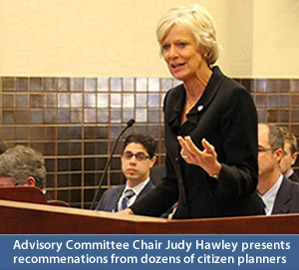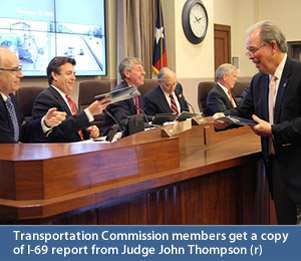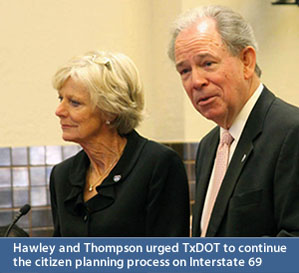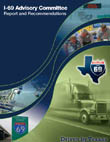• I-69 Advisory Committee Backs Priority Upgrade Projects
The statewide I-69 Advisory Committee presented a sweeping set of recommendations for Interstate 69 route projects to the Texas Transportation Commission today. The ideas, priorities and recommendations are those of the Advisory Committee and members of five Segment Committees made up of local community representatives.
 The report was presented by Committee Chair Judy Hawley who said that from the first day in 2008 the Committee members realized that "completing I-69 is about moving freight, about prosperity and jobs in Texas. I-69 is absolutely critical in moving forward."
The report was presented by Committee Chair Judy Hawley who said that from the first day in 2008 the Committee members realized that "completing I-69 is about moving freight, about prosperity and jobs in Texas. I-69 is absolutely critical in moving forward."
Hawley, who is a commission member for the Port of Corpus Christi, noted that during the past four years there have been dramatic changes in the freight transportation needs of the state. "We realized that our task was not just to create some freight recommendations for today, but to have the flexibility to continue onward because those freight needs are going to be changing."
The Committee was charges by the Transportation Commission with making recommendations on how to plan, develop and finance the I-69 system.
The Advisory Committee report includes the locally focused project priority recommendations that came out of the Segment Committee public input and deliberation process.
The Committee urges TxDOT to aggressively seek interstate highway designation for all completed sections of I-69 utilizing the authority provided in the recently-passed federal highway bill. The Committee calls for maximum use of existing highway footprints in development of I-69. They recommend that early I-69 projects address existing safety, capacity and evacuation needs.
Marc Williams, TxDOT Director of Planning, has been involved in the Interstate 69 development process for several years. He told the Transportation Commission that the dozens of citizen planners serving on the segment and advisory committees "have really been the eyes and ears within their communities and in talking with their neighbors and fellow citizens about the region's transportation needs and challenges and what their vision was for I-69."
Hawley commended the Commission for being able to recruit hundreds of some of the busiest people in Texas to serve on the committees. Those participating the the effort were able to come together behind a common solution to move I-69 forward. "It has been an amazing process," she said.
She said the Commission has accomplished something remarkable -- establishing a public involvement template for moving very difficult planning processes forward for the entire state using local citizens in a grassroots process.
John Thompson, County Judge of Polk County, a member of the Advisory Committee and chairman of the Alliance for I-69 Texas, told the Commission, "For 20 years we have worked on this effort and we feel like we are partners with this Commission. I-69 is something that will have an impact on Texas, North America and the world long past our lives. It is great to see those signs going up. I-69 is becoming a reality."
Transportation Commissioner Jeff Austin III praised Thompson and the Alliance for I-69 Texas members. He said the Alliance is a tremendous resource at the state level and at the federal level specifically in getting federal law changed and in helping bring recognition to the entire I-69 system.
Austin called the citizen planning process a blueprint for building an interstate -- "something we have not had an opportunity to do in Texas for a long time." He pointed to a recent public meeting in Polk County community of Moscow. Local citizens came forward with a specific plan they prefer for routing I-69 in the future. "We (TxDOT) could not have done that," he said. "That came from the community."
Commission Chairman Ted Houghton recalled his personal involvement in I-69 progress over the past decade and said it is important that the advisory groups continue to be active. He said he thinks the upcoming session of the Texas Legislature will be very important to continued development of the I-69 system.
GUIDING PRINCIPLES
In May 2011, the Advisory Committee established seven guiding principles for I‐69 development:
• Recognize I‐69 Texas as critical to moving freight, economic growth, and job creation.
• Achieve Interstate designation on existing suitable highways as quickly as possible.
• Maintain public input as an essential part of all future work and decisions, with an emphasis on addressing the needs of property owners and communities.
• Maximize the use of existing highways to the greatest extent possible while seeking to reduce
program costs and impacts to private property.
• Address safety, emergency evacuations, and emergency response needs.
• Pursue flexibility and efficiencies in the design and construction requirements necessary to
obtain Interstate designation.
• Encourage initiatives that will supplement limited highway funds so as many projects as
possible are completed along the I‐69 system in Texas.
COMMITTEE REPORT RECOMMENDATIONS
1. Constructing Funded Projects
The I-69 Advisory Committee recognizes that TxDOT has already begun the process of funding projects that will improve highways by enhancing safety and serving traffic along the designated routes for I-69. The I-69 Advisory Committee recommends I-69 communities continue identifying their local transportation needs and collaborate with local MPOs, TxDOT district offices and other transportation partners to plan future I-69 improvements so when funding is available, plans are in place to continue progress.
2. Developing I-69 Segment Committee Priorities
The I-69 Advisory Committee recommends continuing progress on the I-69 development priorities identified by the Segment Committees. Currently, over 200 miles of highway are under consideration for Interstate designation. Additionally, 24 projects recommended by the Segment Committees are currently funded for environmental studies or construction. These relief routes and facility improvement recommendations will be addressed in the future. The specific recommended I-69 Segment Committee priorities are listed in the report.
3. Addressing Spot Safety and Capacity Improvements
In addition to developing Segment Committee priorities, the I-69 Advisory Committee also recommends future spot safety and capacity improvements that would help alleviate interim concerns for traffic safety and mobility until upgrade projects eventually fill in the gaps in the I-69 route system. Recommended spot safety and capacity improvements are listed in the report.
4. Planning Studies for Environmental and Route Locations
The I-69 Advisory Committee also recommends initiating environmental and route location studies. Completion of these studies will allow for additional project development phases to begin on these Committee identified priorities. These relief routes and facility improvement recommendations will be addressed in the future. Environmental and route location studies recommended by the I-69 Committees are identified in the report.
5. Maintaining Relevance of I-69 Citizen Planning Process
The I-69 Advisory Committee recognizes the importance of citizen-led planning for I-69 Texas and recommends maintaining the relevance of this grassroots planning effort by using this process to respond to economic demands, further connect Texas communities and update project development recommendations as I-69 continues to grow in Texas. The Committee recommends that the Transportation Commission maintain a community-driven I-69 planning process such as the one originated by the I-69 Advisory and Segment Committees.
SEGMENT COMMITTEE CONTRIBUTIONS
To further enhance community partnerships and participation opportunities, the Texas Transportation Commission created the five I‐69 Segment Committees in 2009 to make local‐level recommendations on the development of I‐69. The segment committees are comprised of local elected officials, metropolitan planning organizations, port authorities, economic development corporations and chambers of commerce, Texas Farm Bureau members and other local stakeholders. The segment committees have developed local‐level recommendations and priorities for establishing I‐69 in their regions.
The segment committees identified transportation needs and challenges in their communities and reviewed conceptual maps as they created a community‐level plan for I‐69. Before finalizing their recommendations, the segment committees completed an extensive public involvement effort where they reached out to more than 5,000 citizens through civic organization meetings, open houses, an online presence, and handing out brochures and comment cards at local businesses, libraries and other frequently visited establishments. The committees received almost 500 comments from citizens and the input and ideas of their local communities was utilized in their final recommendations which were completed in mid-2012.. Using the reports of the five segment committees, the I‐69 Advisory Committee compiled a system‐wide blueprint for the future of I‐69 Texas.
The I-69 Advisory Committee Report is the work of volunteers and does not contain proposals by TxDOT.
![]() Download a high resolution PDF file of the full Advisory Committee Report HERE (4.3 MB file)
Download a high resolution PDF file of the full Advisory Committee Report HERE (4.3 MB file)
Report Maps (PDF)
1. I-69 Approved Funding including some project currently under construction or completed since the planning process began. [View Map]
2. I-69 Segment Committee Priorities [View Map]
3. Recommended Future Spot Safety and Capacity Improvements and Environmental/Route Location and Planning Studies. [View Map]
Members of the
I-69 Advisory Committee
County Judge Arnold Saenz, Alice
County Judge David Silva, Beeville
Ramiro Garza, Edinburg
Chandra Spenrath, El Campo
Alan Clark, Houston
Jim Edmonds, Houston
Steve Stewart, Houston
Pat Liston, La Feria
County Judge John Thompson, Livingston
Mayor Jack Gorden, Lufkin
Jim Wehmeier, Lufkin
Cindy Leleko, Marshall
Joe Phillips, McAllen
Nolan Alders, Nacogdoches
James Carlow, New Boston
Judy Hawley, Portland
Jim Gonzales, Richmond
David Garza, San Benito
County Judge Terry Simpson, Sinton
Jerry Sparks, Texarkana
Mayor Will Armstrong, Victoria
Carbett “Trey” Duhon, Waller
Mayor Domingo Montalvo, Wharton


